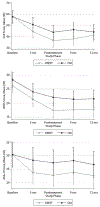Cognitive Rehabilitation and Exposure/Sorting Therapy (CREST) for Hoarding Disorder in Older Adults: A Randomized Clinical Trial
- PMID: 28541646
- PMCID: PMC7295125
- DOI: 10.4088/JCP.16m11072
Cognitive Rehabilitation and Exposure/Sorting Therapy (CREST) for Hoarding Disorder in Older Adults: A Randomized Clinical Trial
Abstract
Objective: To compare the efficacy of Cognitive Rehabilitation and Exposure/Sorting Therapy (CREST) with geriatric case management (CM) in a sample of older adults meeting DSM-5 diagnostic criteria for hoarding disorder (HD).
Methods: Fifty-eight older adults with HD were enrolled in a randomized controlled trial between December 2011 and March 2014. Thirty-one participants received CREST, and 27 participants received CM. Both interventions consisted of 26 individual sessions over a period of 6 months and included several home visits by the study therapists (CREST) or nurses (CM). The Saving Inventory-Revised (SI-R) and the UCLA Hoarding Severity Scale (UHSS) were the main outcome measures.
Results: Participants in the CREST condition had significantly greater improvement on the SI-R than participants in the CM group (group × time interaction: β = 3.95, SE = 1.81, P = .029), with participants who completed the CREST condition averaging a 38% decrease in symptoms and participants who completed the CM condition averaging a 25% decrease in symptoms. In contrast, there was not a significant group × time interaction effect on the UHSS (β = 1.23, SE = 0.84, P = .144), although participants did report greater improvement in symptoms in the CREST condition (35%) than in the CM condition (24%). Treatment gains were maintained at 6-month follow-up.
Conclusions: CREST appears to be an efficacious treatment compared to CM for older adults, but CM also showed meaningful benefits.
Trial registration: ClinicalTrials.gov identifier: NCT01227057.
© Copyright 2018 Physicians Postgraduate Press, Inc.
Conflict of interest statement
Figures


References
Publication types
MeSH terms
Associated data
Grants and funding
LinkOut - more resources
Full Text Sources
Other Literature Sources
Medical

